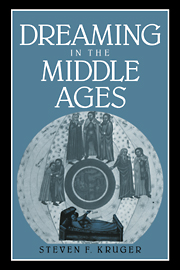Book contents
- Frontmatter
- Contents
- Acknowledgments
- List of abbreviations
- Introduction: modern and medieval dreams
- 1 Dreambooks and their audiences
- 2 The doubleness and middleness of dreams
- 3 The patristic dream
- 4 From the fourth to the twelfth century
- 5 Aristotle and the late-medieval dream
- 6 Dreams and fiction
- 7 Dreams and life
- Notes
- Bibliography
- Index
5 - Aristotle and the late-medieval dream
Published online by Cambridge University Press: 22 August 2009
- Frontmatter
- Contents
- Acknowledgments
- List of abbreviations
- Introduction: modern and medieval dreams
- 1 Dreambooks and their audiences
- 2 The doubleness and middleness of dreams
- 3 The patristic dream
- 4 From the fourth to the twelfth century
- 5 Aristotle and the late-medieval dream
- 6 Dreams and fiction
- 7 Dreams and life
- Notes
- Bibliography
- Index
Summary
DISTRUSTING DREAMS
In the late twelfth century, Thomas of Froidmont warned strongly against a belief in dreams:
Somnia similia sunt auguriis, et qui ea observant, augurari noscuntur. Ergo somniis fides non est adhibenda, quamvis videantur esse vera. Qui in somniis vel auguriis spem suam ponit, non confidit in Deo; et talis est qualis ille qui ventum sequitur, aut umbram apprehendere nititur. Auguria mendacia, et somnia deceptoria, utraque vana sunt. Non debemus credere somniis, ne forte decipiamur in illis. Spes nostra in Deo semper sit firma, et de somniis nulla nobis sit cura. Dignum valde est ut in Deo ponamus spem nostram, et in somniis nullam habeamus fiduciam. Ideo, soror charissima, te moneo, ut mens tua non sit in somniis vel auguriis intenta, sed in Deo omnipotenti sit firma. Si enim auguria vel somnia observaveris, cito decipieris. In omni vita tua contemne auguria et somnia, et pone spem tuam perfecte in Dei providentia; et in hac vita et in futura venient tibi prospera.
Dreams are similar to auguries, and those who observe them are known as participating in augury. Therefore, faith is not to be had in dreams, however much they may seem to be true. The one who places his hope in dreams or auguries, does not have complete faith in God, and such a person is like one who follows after the wind, or tries to catch a shadow.
- Type
- Chapter
- Information
- Dreaming in the Middle Ages , pp. 83 - 122Publisher: Cambridge University PressPrint publication year: 1992



